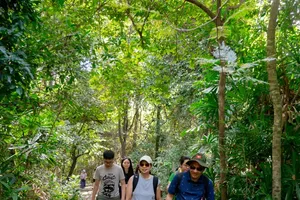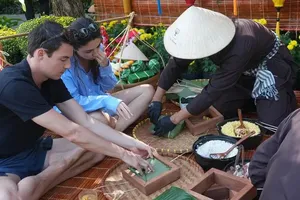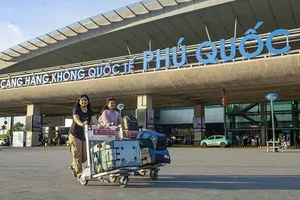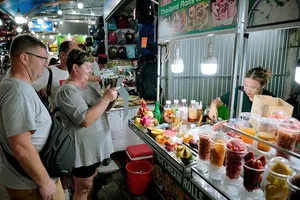
The event focused on transforming the VITA Green certification into a ‘green passport’ for Vietnamese tourism enterprises seeking deeper integration into the global market.
First introduced in 2019, the VITA Green label recognizes businesses that meet environmentally responsible tourism standards, with a strong emphasis on plastic waste reduction since 2018. To date, around 30 businesses have earned the certification, with VITA aiming to expand that number to 100 by year’s end.
VITA President Vu The Binh underscored the urgency of the shift, stating, ‘Green tourism is no longer optional; it’s a mandatory requirement if we aim to succeed in the international market’.
He noted that global travelers, especially in the mid-range and luxury segments, increasingly favor experiences that are eco-conscious, low-emission, and culturally respectful.
It is essential to establish a green brand that meets international standards, said President Vu The Binh adding that serving as a trustworthy commitment to the global community.
To strengthen the VITA Green label’s international appeal, the initiative includes:
- Aligning certification criteria with global benchmarks
- Designing a bilingual logo and slogan
- Building a network of model businesses and destinations
- Launching training programs for sustainable practices
- Entering international cooperation agreements
- Participating in global tourism fairs and forums
The seminar marks a pivotal step in Vietnam’s journey to position its tourism sector as a leader in sustainability and responsible travel.
As outlined in the roadmap, the phase from 2025 to 2026 will concentrate on enhancing internal capabilities; the period from 2026 to 2028 will elevate the brand to a global platform; and from 2028 to 2030, the focus will shift to advanced development and collaboration in academia. By the year 2030, VITA Green aims to establish 200 businesses and 30 exemplary destinations that meet the required standards, in addition to forming partnerships with a minimum of five international organizations.
At the commercial level, the ‘green passport’ will help businesses enhance competitiveness, expand cooperation opportunities, and build credibility when engaging with international tourists. At the sustainable development level, this label contributes to implementing the National Strategy on Green Growth while supporting the goal of achieving net-zero emissions by 2050, as committed by Vietnam at COP26.
The effort to elevate the VITA Green brand is, therefore, more than just a branding project. It is a testament to the shift in mindset within Vietnam's tourism industry: from scattered initiatives and short-term movements to a comprehensive, measurable, and highly integrated strategy.
As global standards for green commitments tighten, having an internationally acknowledged sustainable tourism label will provide a significant competitive edge. When executed thoroughly and effectively from the criteria and management to communications and value chain integration, the ‘green passport’ for Vietnamese tourism enterprises could emerge as a hallmark of Vietnam’s green tourism, comparable to esteemed global brands.
That will be the moment when international visitors recognize Vietnam not only as a beautiful destination, but also as a green, sustainable, and trustworthy nation. At that stage, VITA Green will transcend its role as a mere certification to become a living testament to responsibility, quality, and the pride of the national brand.
Chairman Phung Quang Thang of the Vietnam Green Tourism Association affirmed that VITA Green will not only be a certification, but also a green passport for Vietnamese tourism integrating internationally while preserving a strong Vietnamese identity.
























